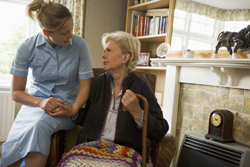Integrating home care for older, frail patients
Aiming to carry out a comprehensive evidence-based assessment of integrated homecare (IHC) in terms of a health technology assessment (HTA), the 'Clinical continuity by integrated care' (HOMECARE) project focused on patients with stroke, heart failure and chronic obstructive pulmonary disease. The HTA, based on practical guides for each of the selected chronic conditions, was developed by international expert groups representing each condition. The EU-funded initiative included clinical trials and pilot experiments with tele-facilities. Project partners developed and documented new discharge pathways for elderly frail somatic patients, for each of the three chronic conditions studied. Researchers propose that these pathways be followed alongside the coordination carried out by general practitioners. The HOMECARE project identified a number of conditions that are crucial to IHC implementation. First, patient psychological values and the home setting are at the core of IHC organisational efficacy. Second, IHC should be delivered by a multidisciplinary outreach team. Third, organisation and finance must necessarily be adapted to the local health system. Lastly, integrated clinical patient-centrism should be balanced with the economics of IHC. Comparing IHC with usual hospital care, the EU-funded study first reviewed the existing knowledge base on IHC for patients with stroke, heart failure and chronic obstructive pulmonary disease. Researchers added to that knowledge through new project surveys and trials. They then worked to develop practical guides on IHC services relevant to the three chronic conditions under study. The practical guides serve as guiding material for local health-care teams planning to implement IHC services, and contributed to generating key input to the final HTA. With studies conducted in countries across Europe, including Poland, Portugal, Sweden, Denmark and the Netherlands, HOMECARE project results point to the effectiveness and potential of IHC for stroke, heart failure and chronic obstructive pulmonary disease patients. This is supported in terms of clinical effectiveness, health economic evaluation, patient and caregiver perspectives, and organisational perspectives. IHC thus represents a sound alternative to usual hospital care, for patients and health care providers, as well as in consideration of societal net savings.







